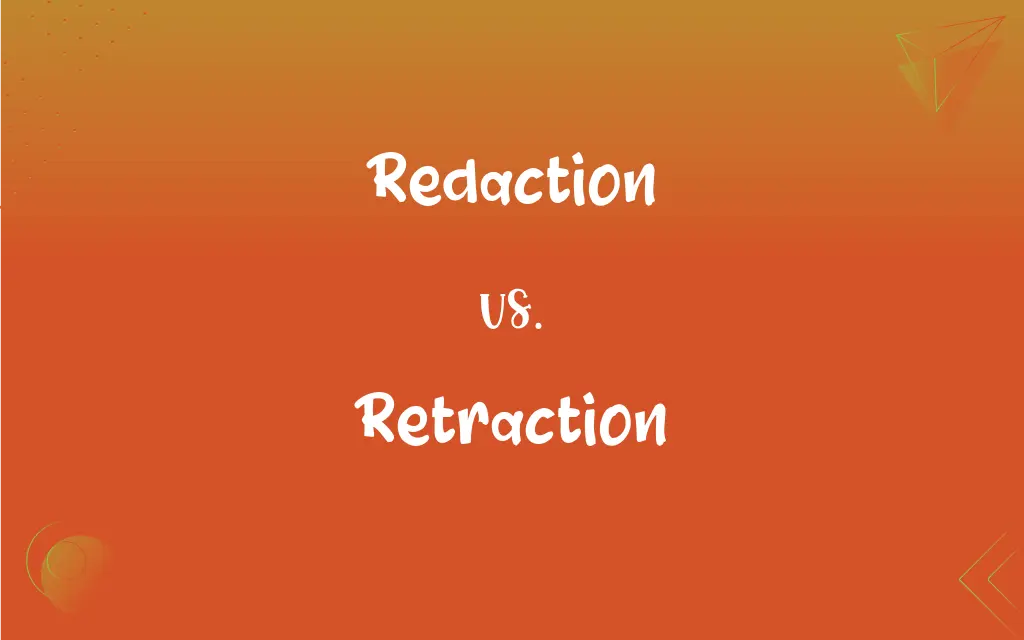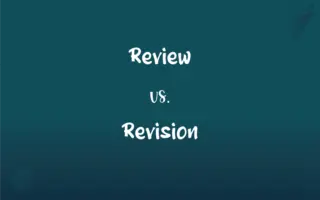Redaction vs. Retraction: What's the Difference?
Edited by Aimie Carlson || By Janet White || Updated on November 18, 2023
Redaction is the process of editing text for publication, often involving the removal of sensitive information, while retraction is the withdrawal of a statement, claim, or published information, typically due to inaccuracies or errors.

Key Differences
Redaction typically refers to the process of removing or obscuring sensitive or confidential information from a document before publication. This action is often associated with privacy concerns or security measures. An example is, "The document was released with heavy redaction." In contrast, retraction is the act of formally withdrawing something that was previously stated or published, usually because it was found to be false or incorrect. For instance, "The newspaper issued a retraction of the article due to inaccurate information."
Redaction is a common practice in legal and governmental documents where protecting sensitive data is crucial. It involves editing the text to hide specific details while making the rest available. "Redaction in legal documents protects client confidentiality." On the other hand, retraction is often seen in the context of media and academia, where it signifies the withdrawal of a statement or publication, acknowledging an error or misinformation. "The scientist retracted their research paper after discovering a critical error."
The purpose of redaction is to allow the broader content of a document to be read while keeping certain parts hidden. It is not necessarily an indication of error but rather a precaution. "Redaction is used to safeguard personal information in public records." Whereas, retraction indicates that something previously communicated is no longer considered valid or true. It is a corrective action. "Retraction of a false statement helps maintain credibility."
Redaction can be recognized by blacked-out or blanked sections in a text, visually indicating the removal of content. It's a selective process focusing on specific parts of a document. "The redaction in the report made certain lines unreadable." Conversely, retraction is a public acknowledgement, often made through the same channels as the original statement or publication, like a retraction notice in a journal. "The magazine published a retraction for the earlier misleading article."
In essence, redaction is a method of editing for privacy or security, while retraction is a form of correction or disavowal of previously shared information. Redaction conceals, and retraction corrects. "Redaction is common in government documents, whereas retraction is frequent in journalism and scientific publishing."
ADVERTISEMENT
Comparison Chart
Definition
Editing to remove or obscure sensitive information
Withdrawal of a statement or information due to errors
Context
Legal, governmental, and private documents
Academic, media, and public statements
Purpose
Protect privacy or confidentiality
Correct false or inaccurate information
Indication
Blacked-out or obscured text
Formal statement or announcement withdrawing information
Implication
Selective concealment for security
Acknowledgement of mistake or misinformation
ADVERTISEMENT
Redaction and Retraction Definitions
Redaction
Process of blacking out text in documents.
The court order included redaction of sensitive information.
Retraction
Publicly disowning a previous publication.
The journal published a retraction of the discredited study.
Redaction
Obscuring parts of a text for confidentiality.
Redaction in the report made personal details unreadable.
Retraction
Withdrawing a published statement or claim.
The author issued a retraction of the erroneous data in their book.
Redaction
Editing a document to conceal certain content.
Redaction is essential for maintaining national security in some documents.
Retraction
Correcting previously released information.
The company issued a retraction of its earlier product claims.
Redaction
Editing out sensitive information from a document.
The redaction of names ensured witness protection.
Retraction
Formal admission of a previous error.
The newspaper's retraction acknowledged the factual inaccuracies.
Redaction
Removal of specific data to protect privacy.
Legal documents often undergo redaction before being released.
Retraction
Taking back a statement or report.
The politician made a retraction of their earlier comments.
Redaction
The act or process of preparing a document for publication, especially by deleting private or sensitive information.
Retraction
The act of retracting or the state of being retracted.
Redaction
An edited work; a new edition or revision.
Retraction
The act of recanting or disavowing a previously held statement or belief.
Redaction
(countable) Edited or censored version of a document.
The government supplied only the redaction to the reporters; the original was kept secret.
Redaction
(countable) The change or changes made while editing.
Redaction
(uncountable) The process of editing or censoring.
The Expense Claims made by Members of Parliament must be subject to redaction before publication under the Freedom of Information Act.
Redaction
The act of redacting; work produced by redacting; a digest.
Redaction
Putting something (as a literary work or a legislative bill) into acceptable form
Redaction
The act of putting something in writing
FAQs
Can redaction be partial?
Yes, it often involves obscuring specific parts of a text.
What is redaction?
Redaction is editing a document to remove sensitive information.
Are redacted documents still useful?
Yes, they can provide information while protecting sensitive details.
What is a retraction?
A retraction is withdrawing a statement due to inaccuracies.
Is a retraction a negative action?
It's often viewed as a responsible action to correct errors.
Does redaction affect the document's credibility?
Not necessarily, as it's often a security measure.
Why is redaction important?
It protects privacy and confidential information.
Why are retractions issued?
To correct false or misleading information.
Is redaction always visible?
Yes, typically through blacked-out or blanked sections.
Can retractions happen in any field?
Yes, though they are common in media and academia.
How is a retraction communicated?
Usually through the same medium as the original statement.
Can retractions damage reputation?
They can, but they also show accountability.
What happens after a retraction?
The information is corrected or removed from the public domain.
Is redaction a form of censorship?
It can be seen as such, but it's primarily for privacy protection.
Can anyone request a retraction?
Usually, those affected by the information can request it.
How often do retractions occur?
They vary based on the field and circumstances.
Can redaction be automated?
Yes, with advanced software, but manual review is often necessary.
Are all redactions legal?
They should comply with legal and ethical standards.
Are redacted documents final?
Usually, but further information might be released later.
What's the impact of a retraction in academia?
It can affect credibility but also signifies integrity in correcting errors.
About Author
Written by
Janet WhiteJanet White has been an esteemed writer and blogger for Difference Wiki. Holding a Master's degree in Science and Medical Journalism from the prestigious Boston University, she has consistently demonstrated her expertise and passion for her field. When she's not immersed in her work, Janet relishes her time exercising, delving into a good book, and cherishing moments with friends and family.
Edited by
Aimie CarlsonAimie Carlson, holding a master's degree in English literature, is a fervent English language enthusiast. She lends her writing talents to Difference Wiki, a prominent website that specializes in comparisons, offering readers insightful analyses that both captivate and inform.































































